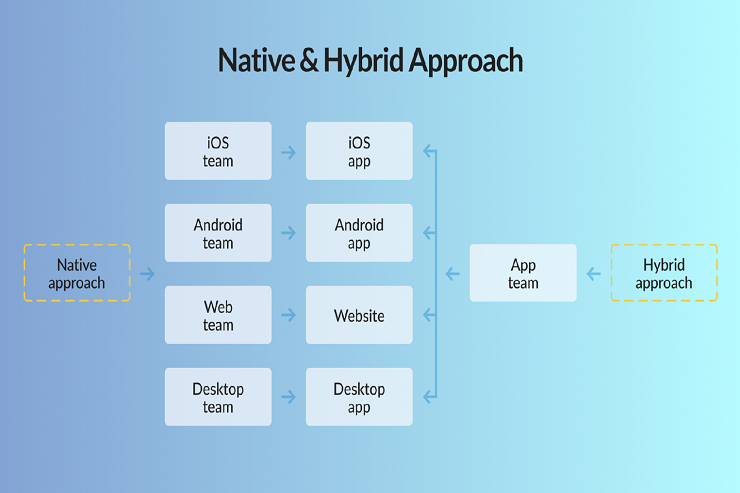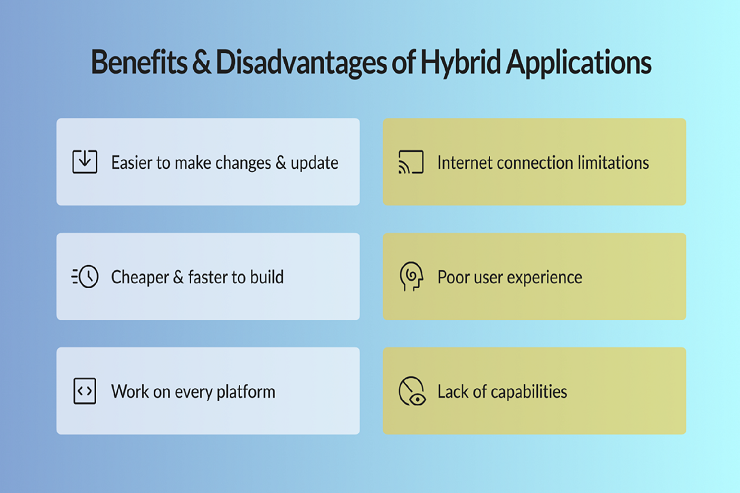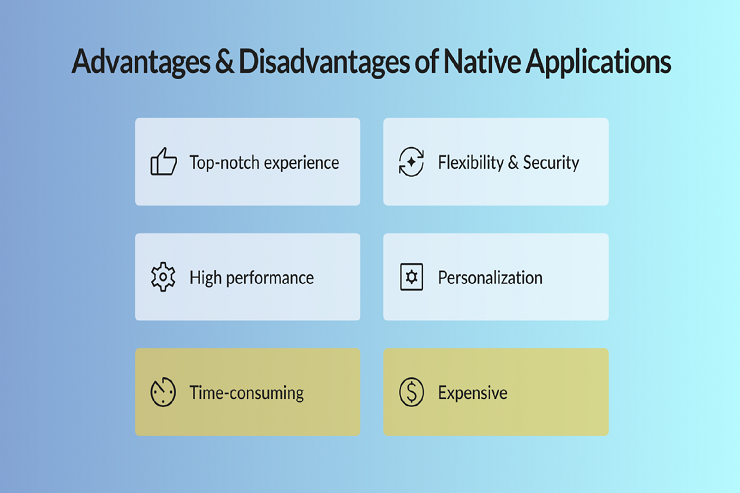
The tech world is buzzing with excitement – software engineers, brace yourselves for an absolute dream come true. The use of mobile apps has greatly increased in the last decade, with a large percentage of the global population now possessing at least one. Entrepreneurs seek to enhance their businesses by developing smartphone solutions and consider the type of app they want to create, whether it be native or hybrid software, as a crucial factor for attracting more customers.
This post will cover the advantages and disadvantages of native and hybrid smartphone applications. Additionally, we will evaluate which development approach is suitable for your specific circumstances.
How Are Both The Smartphone Software Types Different?
Native apps are made for one operating system, while hybrid apps can work on multiple platforms. Hybrid apps are created by incorporating webpages into a native app, resulting in a cohesive interface and functionality similar to that of a website. Moreover, hybrid apps utilize cross-platform capabilities and operate from a single code base, allowing them to function across multiple platforms as opposed to native smartphone solutions.

A native and a hybrid approach to mobile app development
Before You Start Mobile App Development: Pros And Cons Of Hybrid Solutions
If you are thinking about developing hybrid apps, the following information is essential for you to be aware of before you start the development process.

Hybrid mobile apps pros and cons to think out
The app development cost for a hybrid smartphone solution is lower than the native solution. Let’s start with other common hybrid mobile app benefits.
- The solution is suitable for use with any operating system. Hybrid applications utilize one code base for iOS and Android. This is great news for stakeholders whose main goal is reaching the widest audience.
- Fast development. Developers don’t need to write code for every platform. The development and execution of quality assurance tests for the product are also simplified.
- Simpler to update. It is sufficient to make modifications only once for them to be implemented across all of the platforms that are compatible with your hybrid solution for smartphones.
Now that we’ve discussed the advantages of hybrid apps let’s examine their drawbacks so that we can choose the best option after weighing all of the advantages and disadvantages of the situation and moving on.
- Online connectivity is essential. Hybrid app users must be online to use the app’s full capabilities.
- Capacity limits. Hybrid mobile apps cannot access device capabilities due to their design. So, these apps need plugins.
- Poor UX. While iOS and Android interfaces are similar, hybrid apps have terrible UX. This makes the user experience poor.
Read Also: How To Enhance User Experience On Your Website
Benefits And Drawbacks Of Native Smartphone Solutions
Let’s discuss native apps. Software solutions like these are developed specifically for one OS. In the following, we will investigate in further detail the benefits and drawbacks connected with such solutions.

The pros and cons of a native smartphone application
First, let’s take a look at the advantages associated with using native apps, given that it’s always best to get things started on a good note.
- Personalization. Native development is the only way to guarantee that the quality of the design will be maintained to a high standard and that your product will provide a delightful experience for each and every one of its users.
- Complete consumer satisfaction. The design language, unique features, and specified movements of each mobile platform might lead developers and UX designers to tailor apps to do their best on only one of those platforms.
- The value of security. Developing a native app is the one and only way to guarantee that the data of your consumers will be secured in an open and trustworthy manner.
- Excellent performance. It’s possible for an application to have a very high performance level on a single platform if it was built from scratch for that platform and then optimized for it.
- Powerful functioning capacity. Native apps are the only ones that can access a device’s databases and take full use of its hardware. In addition, the usefulness of these tools is in no way constrained in any manner to plugins or any other tools that are provided by a third party.
The most common native app cons are:
- Development cost. It takes skilled employees to create a powerful and flawless native smartphone solution. As a result of this, you need to ensure that you are prepared to make substantial financial investments.
- Timelines for app building. You should seriously consider making apps for both platforms simultaneously if you need the apps faster.
What Type Of Application Should I Pick?
While you’re deciding between hybrid and standard methods of software development, the following reasons should be taken into consideration:
- In complement to developing a website for your business, you are thinking of making an application.
- You need an app that is straightforward and does not have any complex features.
- In order for your application to work properly, there has to be reliable transmission of information that is structured, etc.
Read Also: Seven In Demand Frameworks That Software Developers Must Learn
Summing Up
We have simply covered the fundamentals of mobile app development and the decision between native and hybrid apps in this article. You’ll be able to narrow down your options with the assistance of an expert mobile app development provider. The professionals will offer you with an in-depth consultation on all of the app development issues that you could have and will also supply you with a lucrative smartphone solution that is tailored to your needs.
Author’s Bio:
Yuliya Melnik is a technical writer at Cleveroad. It is a web and mobile app development company in Ukraine. She is passionate about innovative technologies that make the world a better place and loves creating content that evokes vivid emotions.
